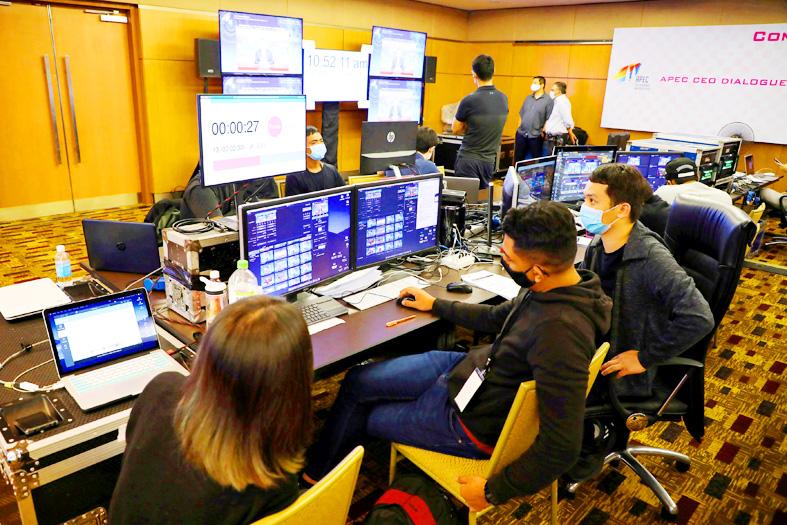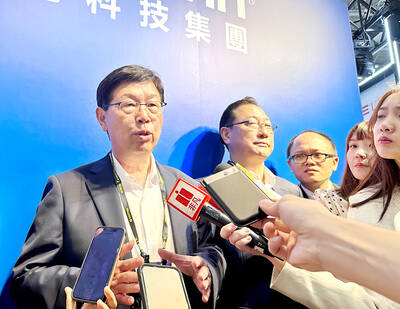Asia-Pacific leaders yesterday called for open and multilateral trade to support a global economy battered by the COVID-19 pandemic.
Chinese President Xi Jinping (習近平), among the leaders at a virtual meeting of the 21-member APEC forum, rejected protectionism and said that globalization was “irreversible.”
“We will not reverse course or run against historical trend by ‘decoupling’ or forming a small circle to keep others out,” Xi said at a forum ahead of the APEC leaders meeting to be held virtually in Kuala Lumpur today.

Photo: Reuters
“China will remain committed to openness and cooperation, and adhere to multilateralism and the principle of extensive consultation, joint contribution and shared benefits,” he said.
Xi said that “mounting unilateralism, protectionism and bullying, as well as backlash against economic globalization” had added to risks and uncertainties in the world economy.
The APEC leaders’ meeting comes as economies are trying to recover from the impact of the pandemic.
US President Donald Trump was due to represent the US at the virtual summit today, a US official said.
It would be the first time he has joined an APEC summit since 2017, the only time he has participated.
Singaporean Prime Minister Lee Hsien Loong (李顯龍) told the APEC forum that he expected “more multilateralists” in the administration of US president-elect Joe Biden.
“I think that they will be more supportive of the WTO, and of APEC. I am not sure that they will be more keen on throwing the doors wide open, or joining the CPTPP, because that depends on domestic politics too,” he said, referring to the Comprehensive and Progressive Agreement for Trans-Pacific Partnership.
Lee also said that US trade policies under Trump had weighed on APEC’s progress in the past few years, which he termed “very slow.”
“Also, they have not been supportive of trade as a win-win proposition,” Lee said.
“The attitude of the Trump administration is that this is a win-lose proposition,” he said.
Trump withdrew the US from the Trans-Pacific Partnership in 2017, which has since changed its name to the CPTPP.
The US is also absent from the world’s largest free-trade bloc, the Regional Comprehensive Partnership Agreement (RCEP) — a 15-nation pact backed by China that was signed last week.
At the previous APEC meeting in 2018, the countries failed to agree on a joint communique, the first time in the bloc’s history, as the US and China stood at opposing ends of talks on trade and investments.
Malaysian Prime Minister Muhyidin Yassin said that APEC countries were working on a “post-2020” vision, and that free and multilateral trade was integral to economic recovery.
“This is essential for our businesses as market stability and predictability are the central pillars which ensure that trade and investment continue to flow, even during times of crisis,” Yassin said.

Taiwan Transport and Storage Corp (TTS, 台灣通運倉儲) yesterday unveiled its first electric tractor unit — manufactured by Volvo Trucks — in a ceremony in Taipei, and said the unit would soon be used to transport cement produced by Taiwan Cement Corp (TCC, 台灣水泥). Both TTS and TCC belong to TCC International Holdings Ltd (台泥國際集團). With the electric tractor unit, the Taipei-based cement firm would become the first in Taiwan to use electric vehicles to transport construction materials. TTS chairman Koo Kung-yi (辜公怡), Volvo Trucks vice president of sales and marketing Johan Selven, TCC president Roman Cheng (程耀輝) and Taikoo Motors Group

Among the rows of vibrators, rubber torsos and leather harnesses at a Chinese sex toys exhibition in Shanghai this weekend, the beginnings of an artificial intelligence (AI)-driven shift in the industry quietly pulsed. China manufactures about 70 percent of the world’s sex toys, most of it the “hardware” on display at the fair — whether that be technicolor tentacled dildos or hyper-realistic personalized silicone dolls. Yet smart toys have been rising in popularity for some time. Many major European and US brands already offer tech-enhanced products that can enable long-distance love, monitor well-being and even bring people one step closer to

RECORD-BREAKING: TSMC’s net profit last quarter beat market expectations by expanding 8.9% and it was the best first-quarter profit in the chipmaker’s history Taiwan Semiconductor Manufacturing Co (TSMC, 台積電), which counts Nvidia Corp as a key customer, yesterday said that artificial intelligence (AI) server chip revenue is set to more than double this year from last year amid rising demand. The chipmaker expects the growth momentum to continue in the next five years with an annual compound growth rate of 50 percent, TSMC chief executive officer C.C. Wei (魏哲家) told investors yesterday. By 2028, AI chips’ contribution to revenue would climb to about 20 percent from a percentage in the low teens, Wei said. “Almost all the AI innovators are working with TSMC to address the

FUTURE PLANS: Although the electric vehicle market is getting more competitive, Hon Hai would stick to its goal of seizing a 5 percent share globally, Young Liu said Hon Hai Precision Industry Co (鴻海精密), a major iPhone assembler and supplier of artificial intelligence (AI) servers powered by Nvidia Corp’s chips, yesterday said it has introduced a rotating chief executive structure as part of the company’s efforts to cultivate future leaders and to enhance corporate governance. The 50-year-old contract electronics maker reported sizable revenue of NT$6.16 trillion (US$189.67 billion) last year. Hon Hai, also known as Foxconn Technology Group (富士康科技集團), has been under the control of one man almost since its inception. A rotating CEO system is a rarity among Taiwanese businesses. Hon Hai has given leaders of the company’s six